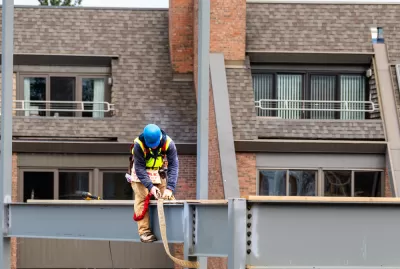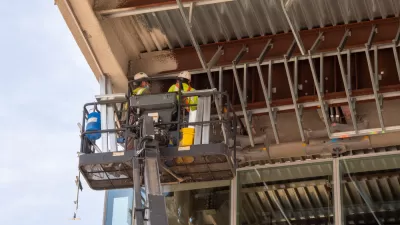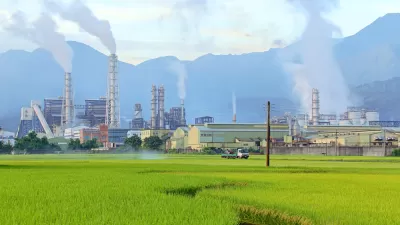The economic fallout of the coronavirus pandemic deepened with the news that construction would be halted on all "non-essential" construction in the state of New York and in Pennsylvania.

On March 26, news was starting to spread around construction sites in Philadelphia that work would be stopping as a result of an order last week by Pennsylvania Governor Tom Wolf. "The City of Philadelphia allowed an additional eight days, until this Friday evening to close their construction sites," reports Jake Blumgart.
In Blumgart’s article, the concern immediately turns to construction workers, especially workers on small residential projects, which mostly include on-union immigrants. There are also concerns about protecting projects from the elements and thieves during the work stoppage, which explains the eight-day grace period allowed in the city of Philadelphia.
On March 27, the state of New York ratcheted up its work stoppage guidelines for construction projects, by order of Empire State Development, the umbrella organization for New York's two principal economic development public-benefit corporations, the New York State Urban Development Corporation and the New York Job Development Authority.
"The order from Empire State Development will temporarily suspend a wide swath of residential and commercial construction, while allowing some work deemed necessary — like building hospitals, infrastructure projects, affordable housing and homeless shelters — to continue," report Janaki Chadha.
"The new restrictions follow a wide-ranging order from Gov. Andrew Cuomo last week that deemed all construction 'essential' — spurring pushback from elected officials and workers who had to report as usual to job sites around the city while the in-person operations of numerous other industries were halted," adds Chadha.
In each case, the question of what kind of construction work qualifies as "essential" during the pandemic is central to each state's situation. In each case, the construction of hospitals and other medical facilities are considered essential. In New York, essential construction also includes infrastructure projects, affordable housing, and homeless shelters.
FULL STORY: Construction workers look to looming coronavirus shutdown and see a ‘sinking boat’

Planetizen Federal Action Tracker
A weekly monitor of how Trump’s orders and actions are impacting planners and planning in America.

Maui's Vacation Rental Debate Turns Ugly
Verbal attacks, misinformation campaigns and fistfights plague a high-stakes debate to convert thousands of vacation rentals into long-term housing.

Restaurant Patios Were a Pandemic Win — Why Were They so Hard to Keep?
Social distancing requirements and changes in travel patterns prompted cities to pilot new uses for street and sidewalk space. Then it got complicated.

In California Battle of Housing vs. Environment, Housing Just Won
A new state law significantly limits the power of CEQA, an environmental review law that served as a powerful tool for blocking new development.

Boulder Eliminates Parking Minimums Citywide
Officials estimate the cost of building a single underground parking space at up to $100,000.

Orange County, Florida Adopts Largest US “Sprawl Repair” Code
The ‘Orange Code’ seeks to rectify decades of sprawl-inducing, car-oriented development.
Urban Design for Planners 1: Software Tools
This six-course series explores essential urban design concepts using open source software and equips planners with the tools they need to participate fully in the urban design process.
Planning for Universal Design
Learn the tools for implementing Universal Design in planning regulations.
Heyer Gruel & Associates PA
JM Goldson LLC
Custer County Colorado
City of Camden Redevelopment Agency
City of Astoria
Transportation Research & Education Center (TREC) at Portland State University
Jefferson Parish Government
Camden Redevelopment Agency
City of Claremont




























